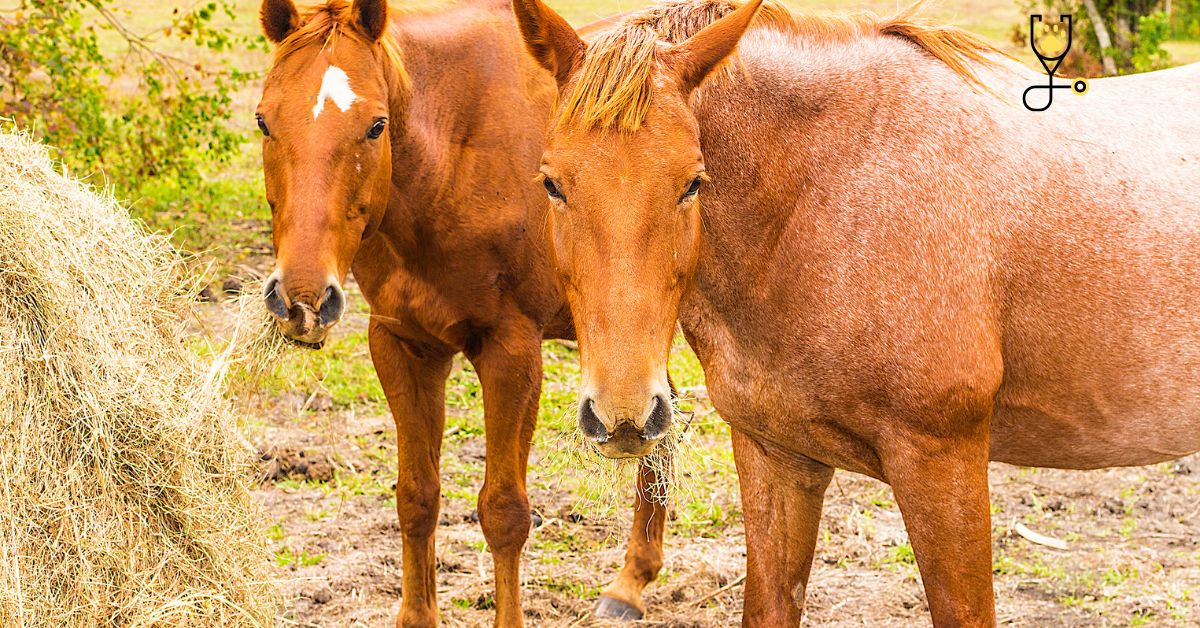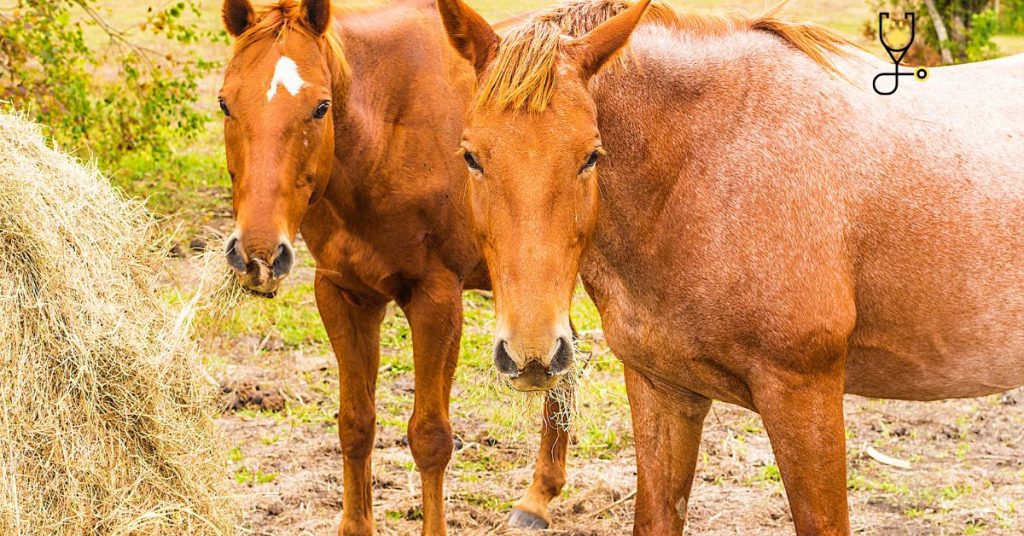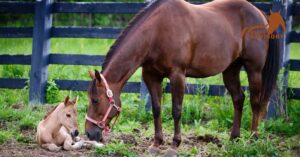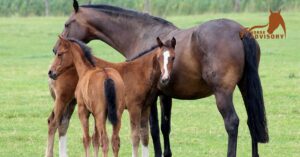How Much Hay to Feed Your Horse? (%per day)
Your horse’s hay intake depends on several factors including their age, size, and activity level. A general guideline to follow is 1-2% of their body weight per day. So a 500-pound horse should receive 5 to 10 pounds (2.3 – 4.5 kg) of hay each day to meet his or her nutritional needs. However, if your horse is pregnant, lactating, in heavy training, or has any special health conditions, you may need to increase the amount of hay they receive per day. It’s also important to note that not all hays are created equal! Make sure to select hay with high-quality ingredients and an appropriate balance of nutrients for your horse’s needs. To ensure your horse is getting enough hay each day, take the time to measure out its portion rather than relying on eyeballing it. By doing this you can more accurately monitor how much hay they’re eating and adjust their intake as needed.
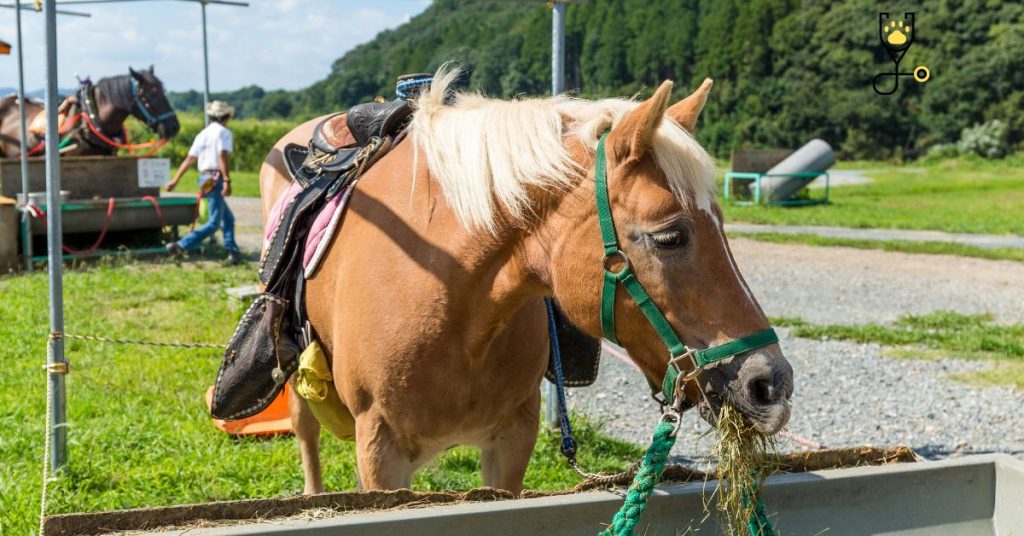
The best way to feed hay is by using an elevated feeder if you have one available. This will help reduce waste and keep your horse’s neck in a more natural position while eating. If you don’t have access to an elevated feeder, simply spread the hay evenly across a flat surface for your horse to graze on throughout the day. No matter which method of feeding you choose, always make sure that plenty of fresh water is available for your horse to drink. With the right amount of hay, your horse can stay healthy and happy! From the time they are foals, horses have a natural instinct to graze for food throughout the day. Offering your horse hay at regular intervals is an important part of their diet that helps keep them healthy and fulfilled. The key is finding the right balance between too much and not enough hay per day. While it’s essential to know how much hay to feed your horse, it’s equally important to pay attention to what type of hay you’re providing. Quality matters when it comes to selecting hay because different types contain varying levels of nutrients and calories. Be sure to select a high-quality option with the right combination of vitamins and minerals for your horse. Now that you know how much hay to feed your horse, it’s time to get started! With the right amount of hay, your horse can remain healthy and happy for many years to come. So don’t hesitate – stock up on hay and make sure your four-legged friends are getting all the nutrients they need!
10 Ways to Calculate How Much Hay to Feed Your Horse
1. Determine your horse’s body weight – A general guideline to follow is 1-2% of their body weight per day.
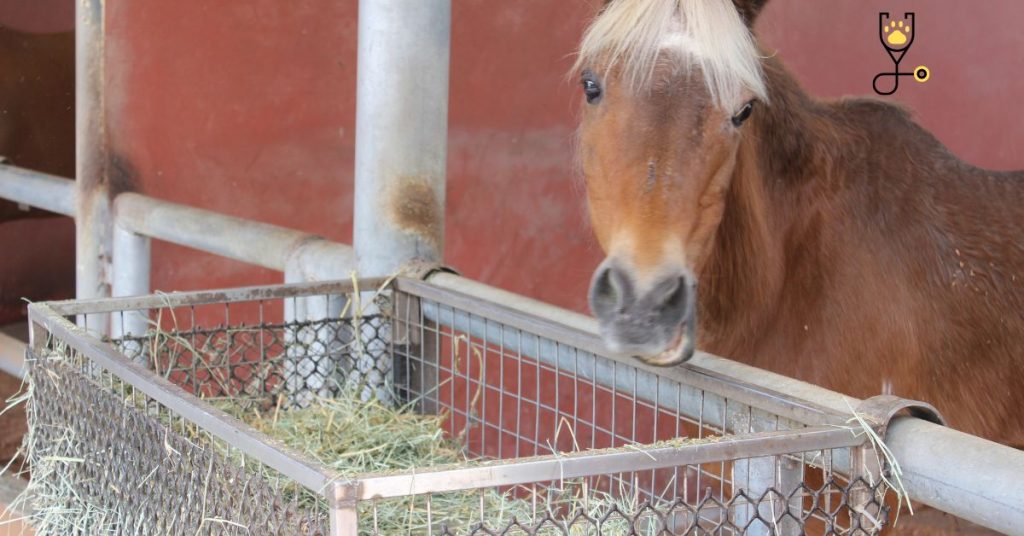
2. Consider any special health or dietary needs – If your horse is pregnant, lactating, in heavy training, or has any special health conditions, you may need to increase the amount of hay they receive per day.
3. Choose high-quality hay – Make sure to select hay with high-quality ingredients and an appropriate balance of nutrients for your horse’s needs to ensure they get all the vitamins and minerals they need!
4. Measure out portions accurately – The best way to feed hay is by using an elevated feeder if you have one available. Take the time to measure out your horse’s portion rather than relying on eyeballing it.
5. Spread the hay evenly – If you don’t have access to an elevated feeder, simply spread the hay evenly across a flat surface for your horse to graze on throughout the day.
6. Feed small amounts at regular intervals – Horses have a natural instinct to graze for food throughout the day, so offering your horse hay at regular intervals is an important part of their diet that helps keep them healthy and fulfilled.
7. Choose freshwater – Always make sure that plenty of fresh water is available for your horse to drink since hydration is critical!
8. Monitor intake and adjust accordingly – By measuring out portions accurately, you can more accurately monitor how much hay they’re eating and adjust their intake as needed.
9. Provide supplemental nutrition – If your horse needs additional energy or protein, consider providing a supplement such as oats, alfalfa pellets, or grain mix.
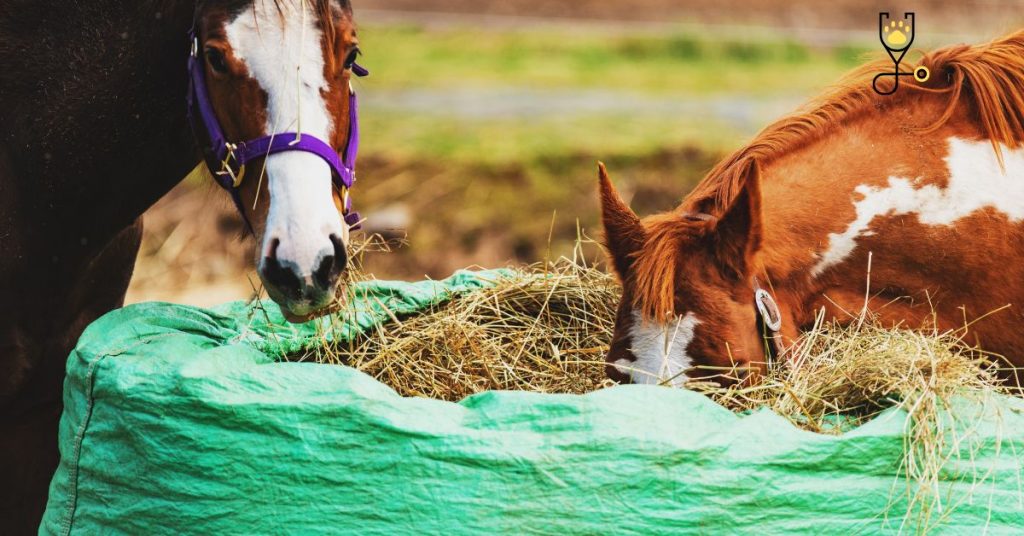
When it comes to feeding hay to your horse, there are a lot of variables to consider. How much hay you need to feed your horse will depend on a variety of factors, including the horse’s age, weight, and activity level. In this blog post, we’ll outline 10 different ways you can calculate how much hay to feed your horse. By understanding the different methods, you can tailor the amount of hay you’re feeding your horse to ensure they’re getting the right nutrition. So without further ado, let’s get started!
10. Seek professional advice – If you’re ever unsure about how much hay to feed your horse or what type to choose, contact a nutritionist or veterinarian for expert advice!
Note:
Now that you know the basics of calculating how much hay to feed your horse each day, it’s time to put this knowledge into practice! Remember that quality matters when selecting hay because different types contain varying levels of nutrients and calories. Be sure to provide plenty of fresh water and monitor your horse’s intake to ensure they stay healthy and happy for many years to come. With the right balance of hay, you can help your four-legged friends live long and fulfilling life.
Conclusion
Feeding your horse the right amount of hay at regular intervals is an essential part of keeping them healthy and happy. To make sure they’re getting the right combination of nutrients, select a high-quality hay option that meets their specific dietary needs. Monitor their intake to ensure they’re receiving enough hay each day, and always provide plenty of fresh water for hydration. With these 10 tips on how much hay to feed your horse in mind, you can now confidently give your four-legged friends all the nutrition they need! Good luck!
Frequently Aske Questions
Q: How long does hay last?
A: Hay can last anywhere from 6 months to a year, depending on the storage method and type of hay. Properly stored hay should be dry and free from mold or other contaminants. Monitor for signs of spoilage and replace any spoiled hay as soon as possible.
Q: Is it ok to feed my horse only hay?
A: While some horses may do well on a diet consisting solely of hay, it is important to provide supplemental nutrition such as oats, grain mix, alfalfa pellets, or vitamin supplements to ensure they get all the vitamins and minerals they need. Contact a veterinarian or nutritionist if you’re unsure how best to supplement your horse’s diet.
Q: How much hay should I feed my horse?
A: The exact amount of hay to feed your horse depends on their age, size, and activity level. Generally speaking, you should aim to provide 1-2% of your horse’s body weight in hay each day. Always monitor intake and adjust as needed.
Q: Is fresh or dried hay better for my horse?
A: Both fresh and dried hay are suitable options for horses, but it is important to select high-quality varieties that contain the right balance of nutrients for your horse’s needs. Monitor your horse’s intake and adjust as needed to ensure they stay healthy and happy.
Q: Does my horse need hay year-round?
A: Yes, horses should have access to hay all year round. Providing a variety of different types of hay throughout the year can keep your horse from getting bored with its diet and provide them with the essential vitamins and minerals they need. Monitor intake carefully and make adjustments as needed. The Bottom Line Feeding your horse the right type and amount of hay is an important part of keeping them healthy and happy. Select high-quality varieties based on your horse’s dietary needs, monitor intake to ensure they are receiving enough nutrition, and always provide plenty of fresh water for hydration! With these 10 tips in mind, you can now confidently feed your four-legged friends all the hay they need!
